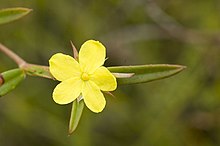Hibbertia salicifolia
| Erect guinea flower | |
|---|---|

| |
| Scientific classification | |
| Kingdom: | Plantae |
| Clade: | Tracheophytes |
| Clade: | Angiosperms |
| Clade: | Eudicots |
| Order: | Dilleniales |
| Family: | Dilleniaceae |
| Genus: | Hibbertia |
| Species: | H. salicifolia |
| Binomial name | |
| Hibbertia salicifolia | |
| Synonyms[1] | |
| |
Hibbertia salicifolia is a species of flowering plant in the family Dilleniaceae and is endemic to eastern Australia. It is a shrub with loose reddish bark, linear to oblong leaves and yellow flowers with the stamens arranged all around the carpels.
Description
Hibertia salicifolia is an erect, relatively large shrub with all but its youngest branchlets covered with loose, reddish bark. The leaves are linear to oblong, 15–50 mm (0.59–1.97 in) long and 2–5 mm (0.079–0.197 in) wide on a petiole 1–2 mm (0.039–0.079 in) long. The flowers are 12–15 mm (0.47–0.59 in) wide, arranged in leaf axils and are more or less sessile. The five sepals are joined at the base, 4–6 mm (0.16–0.24 in) long and the petals are yellow and 7–9 mm (0.28–0.35 in) long with the stamens arranged all around the more or less glabrous carpels. Flowering occurs from spring to early autumn.[2][3]
Taxonomy
This species was first formally described in 1817 by Augustin Pyramus de Candolle in Regni Vegetabilis Systema Naturale and given the name Adrastaea salicifolia from specimens collected near Botany Bay.[4][5] In 1859, Ferdinand von Mueller changed the name to Hibbertia salicifolia in Fragmenta Phytographiae Australiae.[6][7] The specific epithet (salicifolia) means "willow-leaved".[8]
Distribution and habitat
Hibbertia salicifolia grows in coastal swamps and heath from south-east Queensland to the Royal National Park in New South Wales.[2]
References
- ^ a b "Hibbertia salicifolia". Australian Plant Census. Retrieved 11 September 2021.
- ^ a b "Hibbertia salicifolia". Royal Botanic Garden Sydney. Retrieved 11 September 2021.
- ^ Carolin, Roger C.; Tindale, Mary D. (1994). Flora of the Sydney region (4th ed.). Chatswood, NSW: Reed. pp. 273–275. ISBN 0730104001.
- ^ "Adrastaea salicifolia". APNI. Retrieved 11 September 2021.
- ^ de Candolle, Augustin P. (1817). Regni Vegetabilis Systema Naturale. Paris. pp. 424–425.
- ^ "Hibbertia salicifolia". APNI. Retrieved 10 September 2021.
- ^ von Mueller, Ferdinand (1859). Fragmenta Phytographiae Australiae. Vol. 1. Melbourne: Victorian Government Printer. p. 161. Retrieved 11 September 2021.
- ^ Sharr, Francis Aubi; George, Alex (2019). Western Australian Plant Names and Their Meanings (3rd ed.). Kardinya, WA: Four Gables Press. p. 300. ISBN 9780958034180.
